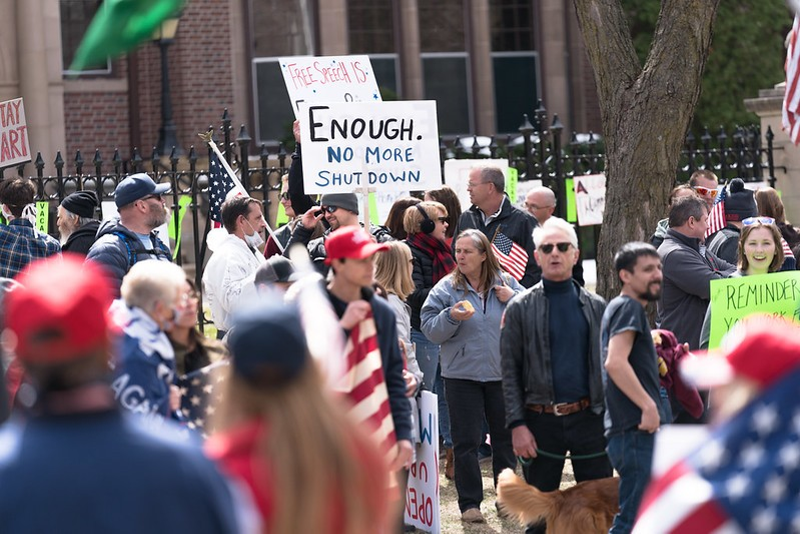As often as one hears slavery described as America’s original sin, it’s apparently been far too easy for Americans to avoid considering what that means. Given the incomprehensibly massive amount of wealth generated by the extraction of billions of hours of labor annually from 15% of the population for most of the first 100 years of the nation’s existence, not to mention all the blood that was shed to protect this institution, it’s to some degree understandable that America’s dependence on a permanent underclass would only be masked, not cured, by slavery’s abolition.
Of course, it’s long been observed that a wealthy elite has maintained its control throughout U.S. history by exploiting the lower classes — “the blacks, the Indians, the very poor whites” — to keep a large enough middle class comfortable enough to consent to their rule. When a certain group of people are “relegated, by and large, to the worst jobs, [and] the worst of everything, [including] housing [and] education,” that of course provides a substantial material buffer for everyone else. Accordingly, for another century after slavery was outlawed, black people were still so plainly kept to second-class citizenship that the Civil Rights and Voting Rights acts had to be passed in the 1960s to keep the Constitution from becoming entirely meaningless and the nation from going up in flames. This then required the dedication of the next half-century to neoliberal “reforms” intended to make these new civil rights worthless by obliterating once fundamental restraints on corporate power — like organized labor, antitrust laws, trade regulations, and campaign-finance restrictions — allowing for unprecedented manipulation of the government and economy by a select few. Thus, susceptibility to membership in America’s permanent underclass that was once largely and solidly determined by one’s race has become far less comprehensibly determined by one’s increasingly immobile economic status.
Needless to say, a lot of formerly insulated white people have become understandably confused about all of this, and increasingly upset about it as it’s unfolded. It’s clear enough that this discontent is what allowed Donald’s Trump’s “Make America Great Again” campaign to work in 2016, not to mention its having fueled the preceding decades of insane culture-war politics intended to distract from these underlying realities.
And for those who would claim that the entirety of U.S. history can be fairly boiled down to a struggle between those who are comfortable with there being a permanent underclass of exploited people and those who aren’t? Well, it’s as hard as ever to argue with them today.
Here’s the link to our original story by @Colebehr_report and @AnnaStaver: https://t.co/ZWpzWChtzD
— Joshua A. Bickel (@joshuabickel) April 15, 2020
Even before the coronavirus hit, it was easy enough to see the parallels between a nation where 15% of the population was forced to work for free by virtue of having been born a slave, and one where 62% are forced to live paycheck to paycheck, at best, by virtue of having been born poor. Social mobility in America has long been at a modern low, with three Americans holding more wealth than the bottom 50% of the population, and those interested in exploiting the labor of that bottom half increasingly less obliged to be less subtle about it than slaveholders were before the 13th Amendment was passed.
And now we have the incredible spectacle of a few billionaires — amplified by a billionaire president, millionaire business owners, billion-dollar media organs, neo-Nazis, and other assorted bozos — staging protests to convince state officials to ignore the scientific consensus on how to combat a virus that’s killing growing thousands of Americans each week. All in the name of “reopening” an economy where the poorest Americans—those needing to work “essential” jobs to survive and those stuck in the nation’s prisons and poorest neighborhoods, who are on all counts, disproportionately, black Americans—will bear the brunt of the risk.
While it’s easy enough to see why the few at the top of this arrangement would seek to perpetuate it, the participation of everyone else becomes harder to understand every day.
Today’s reopen rally organizer Steve Hasty of Murfreesboro says what he misses most is sitting in restaurants and getting free drink refills.
— Natalie Allison (@natalie_allison) April 20, 2020
“I hate having to get two iced teas in the drive thru,” he says. pic.twitter.com/373qBIeHof
Especially as the contrast deepens between the U.S., where unprecedented millions are losing their jobs and their job-connected health insurance, and most other developed nations on Earth, where, thanks to it having been decided that all citizens are entitled to a certain level of social welfare, have reallocated resources to allow the pandemic to be managed far more effectively.
Of course, being comfortable with the existence of a permanent underclass and being aware of its existence are two different things, and the former certainly doesn’t require the latter. But this whole thing where the rich placate the middle class by exploiting the poor requires a stable enough middle-class in the first place, and really doesn’t work if the poor people are making everyone else sick with a deadly virus. And when people are literally dropping dead from believing their billionaire overlords’ ridiculous lies about this virus it all seems especially unsustainable.
Thankfully, recent polls are showing that a great majority of Americans aren’t buying what the “reopen America” protesters are selling. Original sin or not, this all looks like some type of reckoning. Though, I am admittedly an optimist.


